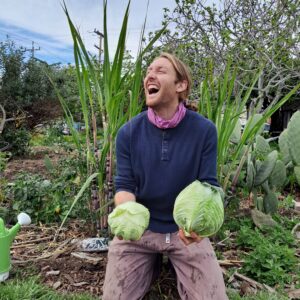Cole Rainey
PhD CandidateView all Current Lab Members

Cole is carved by Irish pookas, sung through Scottish lowlands, sought alongside Pilgrim ancestors, and pruned amidst five generations of colonizers in California. Cole believes in the radical power of Earth stewardship to heal communities, reclaim ancestral traditions, and lead us towards collective liberation. Atonement and reparations are central to this vision. Cole’s work with the Berkeley Agroecology Lab focuses on soil as a medium for collective healing, mapping how community-based efforts towards food sovereignty are restoring soil across contaminated landscapes. This has included: farming in community, measuring soil fungi and nematodes, mapping food distribution networks, and leading land-based educational programs. Their organizing sprouts from land-based movements, where they have conspired with monarch butterflies to re-imagine the commons, built altars to grief, led public performance art pieces on soil regeneration, and supported mutual aid efforts across the Bay Area.
